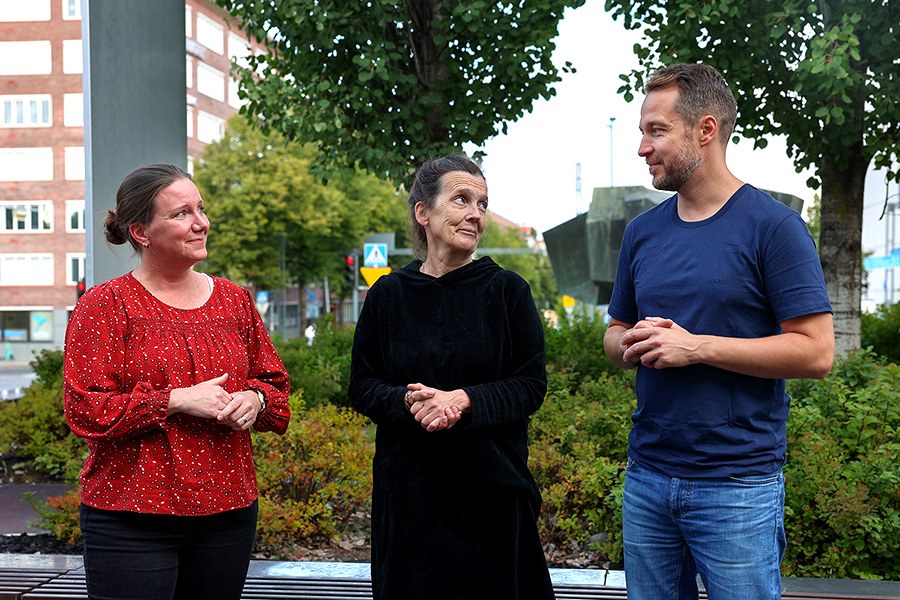Tampere University opens a WHO Collaborating Centre: “Health is involved in all policies”

The World Health Organization (WHO) has designated Tampere University as a WHO Collaborating Centre.
Collaborating Centres are institutions designated by the organisation’s Director-General to carry out activities that support WHO’s programmes.
The Collaborating Centre in Tampere conducts international research and translates information that promotes the health in all policies approach across the world.
“The Collaborating Centre is an important part of Tampere University’s globalisation because it combines the know-how developed at the University with meeting global challenges. The Centre fosters new projects and opens new opportunities for students and researchers. The Centre will also strengthen interaction between research and policymaking,” says Dean Juho Saari, Professor of Social and Health Policy at the Faculty of Social Sciences.
The operations are led by Professor Meri Koivusalo, Research Director Lauri Kokkinen and Professor Salla Atkins. According to the researchers, scientific knowledge can influence policies that promote health and diminish health disparities worldwide. Global challenges require cross-sectoral co-operation.
“The conditions in which people are born, live, work and age also determine their health. In the Centre’s research and co-operation, we will emphasise ways in which societal decisions and policies can promote public health, narrow health disparities, and ensure universal health services,” Koivusalo says.
WHO designates Collaborating Centres for four-year periods.
Societal aspects determine health
Health in All Policies is the World Health Organization's spearhead strategy. In the UN’s Earth Summit in Rio in 2011, 165 countries committed to implementing the strategy.
Finland already has a long history of including health aspects in other policies than those on health.
“We have success stories in areas such as, for example, traffic safety, occupational safety, and tobacco policies. However, Finland still has much to learn, for instance, about how to include health in economic policies,” Kokkinen points out.
Setting up the Collaborating Centre is based on Finland’s active role in promoting Health in All Policies. In 2013, the Helsinki statement issued by WHO emphasised the importance of cross-sectoral work for promoting health. (Helsinki Statement on Health in All Policies).
The Collaborating Centre in Tampere will continue this work by concentrating on the social determinants of health and their role in decision-making.
International co-operation in health promotion
The Centres form a collaboration network that operate in WHO’s spheres of activities. Good health and well-being are one of the United Nations Sustainable Development Goals. Many of the goals also have an indirect link to health.
“The Centre enables us to collaborate with other UN organisations. In academic work, it facilitates building international consortia for conducting research projects,” Atkins emphasises.
Tampere University’s researchers co-operate especially with centres working on similar themes in, e.g., South Australia, United Kingdom, Canada, and South Africa.
Tampere University already plays a significant role and has wide-ranging expertise on health care, public administration, public health policy, cross-sectoral co-operation, and gender equality research. The Collaborating Centre increases the University’s international networking on social and health policy topics.
For the researchers, the Collaborating Centre is an acknowledgement of international-level expertise.
“The Collaborating Centre supports the societal impact of Tampere University and is a significant advantage in international research projects. We concentrate on themes that have been agreed with WHO but also open avenues for more wide-ranging co-operation,” Kokkinen mentions.
Opening seminar in September
Together with the Global Network for Health in All Policies (GNHiAP), Tampere University’s Collaborating Centre will be officially opened in a seminar organised on 5–6 September 2023.
The speakers include WHO representatives and other experts from different parts of the world. A meeting of the GNHiAP network will also be held during the seminar. GNHiAP’s mission is to work with various stakeholders to address health determinants by supporting the Health in All Policies approach.

Professor Meri Koivusalo
meri.koivusalo [at] tuni.fi (meri[dot]koivusalo[at]tuni[dot]fi)
tel. +358 50 4377 540
Research Director Lauri Kokkinen
lauri.kokkinen [at] tuni.fi (lauri[dot]kokkinen[at]tuni[dot]fi)
tel. +358 50 318 2114
Professor Salla Atkins
salla.atkins [at] tuni.fi (salla[dot]atkins[at]tuni[dot]fi)
tel. +358 50 437 7398
Tampere Centre for Health in All Policies and Social Determinants of Health: hiap-sdh [at] tuni.fi (hiap-sdh[at]tuni[dot]fi)
---
Photographs: Mikko Korhonen
WHO’s Collaborating Centre in Tampere
Tampere Centre for Health in All Policies and Social Determinants of Health
The co-operation is driven by WHO’s designation which concentrates on the societal determinants of health as part of the more wide-ranging actions and goals of the welfare state.
The tasks of the Centre include
- strengthening the knowledge base of government strategies.
- increasing WHO’s research-based knowledge on social security, impacts of social security programmes and social policy, and health equity.
- providing technical support for WHO on the monitoring of social determinants of health and health equity impacts in different sectors and levels of government.
- supporting WHO to increase education and capacity building.
WHO’s Collaborating Centre (tuni.fi)
Centre for Health in All Policies and social determinants of health (Centre’s website)





